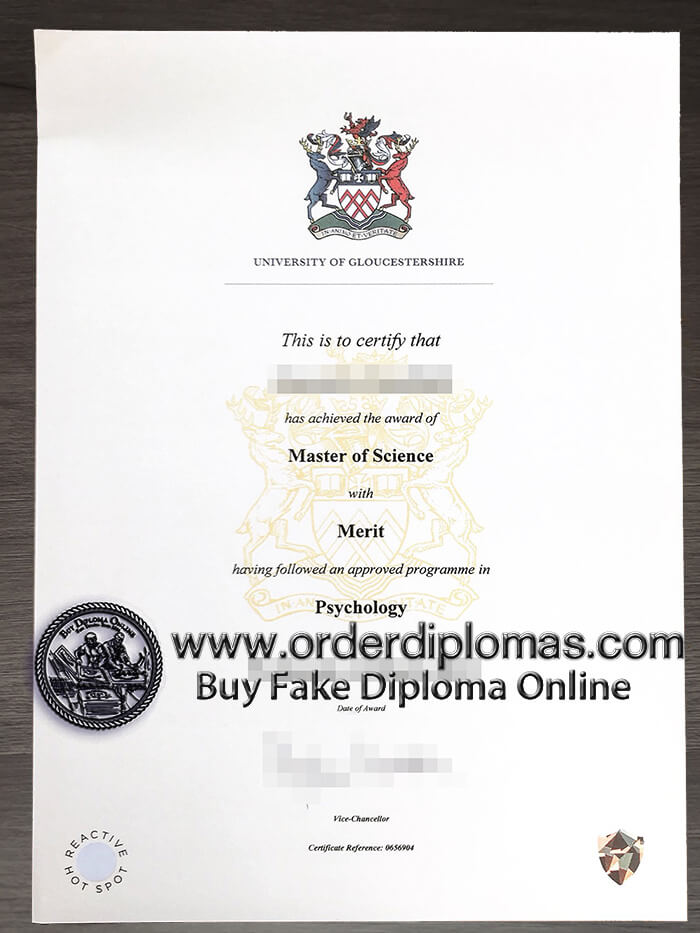
buy fake University of Gloucestershire certificate
How to buy fake University of Gloucestershire diploma? how to buy fake University of Gloucestershire degree? how to buy fake University of Gloucestershire certificate? buy fake University of Gloucestershire diploma, buy fake University of Gloucestershire degree, buy fake University of Gloucestershire certificate, buy fake diploma, buy fake degree, buy fake certificate, make fake diploma, order fake diploma.
The University of Gloucestershire is a public university based in Gloucestershire, England. It is located over three campuses, two in Cheltenham and one in Gloucester, namely Francis Close Hall, The Park, Oxstalls and The Centre for Art and Photography being near to Francis Close Hall. In March 2021 the university purchased the former Debenhams store in Gloucester City Centre, with a new campus due to open there in 2023.
The university is the recent successor of a large number of merged, name-changed and reformed institutions of further and higher education. Its history spans nearly two centuries. It originates from the merger of two distinct strands of educational provision in Gloucestershire being that provided by Local Government and that founded by the Anglican Church.[2][3] The university traces its earliest civic history to the Cheltenham Mechanics’ Institute in 1834, and to the Cheltenham Training College in its Church history, established in 1847, by the Reverend Francis Close. Cheltenham and Gloucester College of Higher Education was created in 1990 from the two distinct strands. In October 2001, the college was awarded university status.
The university provides almost 100 undergraduate courses and around 57 taught post-graduate courses within eight schools.
A 10-year memorandum of understanding exists between the university, Gloucestershire College and South Gloucestershire and Stroud College to support access to higher education.
Mechanics’ Institutes
Mechanics’ Institutes developed in the United Kingdom over the 19th century. A number formed the earliest roots of Universities and Colleges. The Cheltenham Mechanics Institute is associated with a notable historical incident. A speaker, George Holyoake, became the last person prosecuted and convicted for blasphemy following a public lecture he delivered at the institute in April 1842.
Anglican Foundation
The Anglican Foundation of the University of Gloucestershire evolved from the Christian Foundation of the former colleges of St. Mary and St. Paul, two of the institutions which came together to create the university. Until September 2011, Foundation Fellows played a significant role in the governance of the university. Following a review of governance by the university in 2010/11, it was agreed that council should be responsible for appointing all its external members. Foundation Fellows are still eligible to apply to council to become external members.
2001-present day
In February 2012 Rennie Fritchie was announced as the new chancellor succeeding Lord Carey of Clifton, the former Archbishop of Canterbury. Sir Henry Elwes and the former bishop of Gloucester Michael Perham are pro-chancellors. As of August 2011, Stephen Marston holds the post of vice-chancellor.
2009–2011
In 2009–2010 several formerly senior figures in the university resigned. In November 2009, Paul Bowler, the deputy vice-chancellor, resigned shortly after being suspended from his post only seven months after joining the institution. Paul Bowler, a former investment banker who joined Gloucestershire in May 2009, was on a week’s leave when he was told not to return to work. On 7 December, a university spokesperson said, “The deputy vice-chancellor Paul Bowler, has resigned. Financial benefits have not been sought by Mr Bowler, who is leaving of his own accord to pursue other interests”.
In December 2009 Dr. Sharp, dean and associate pro vice-chancellor, following his resignation, took up a post in the new UK Higher Education International Unit.
The vice-chancellor, Patricia Broadfoot, resigned in March 2010, during conflicting views on the financial health of the institution. The precise circumstances of this resignation and the salary paid to her as recorded in the public accounts have attracted various media attention being the reported highest of all UK vice-chancellors for the year.
In May 2010, the chancellor, Lord Carey, resigned.
In September 2010, Paul Bowler was a witness in an employment tribunal case brought by a member of staff of the university under the ‘whistleblowing’ legislation – the Public Interest Disclosure Act. The tribunal found for the complainant and outcome was reported in the higher education press.
In March 2011, Paul Hartley resigned.

 USA Diplomas
USA Diplomas Canada Diplomas
Canada Diplomas UK Diplomas
UK Diplomas Australia Diplomas
Australia Diplomas Germany Diplomas
Germany Diplomas Malaysia Diplomas
Malaysia Diplomas Singapore Diplomas
Singapore Diplomas Other countries
Other countries Transcript-Form.xlsx
Transcript-Form.xlsx
